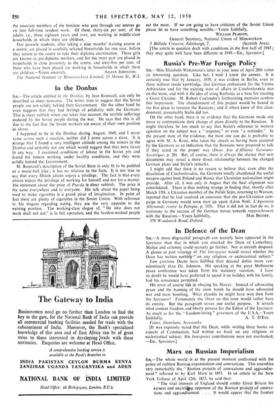Russia's Pre-War Foreign Policy
SIR, Miss Elizabeth Wiskemann's letter in your issue of April 28th raises an interesting question. Like her, I wish I knew the answer. It is certainly true that by January, 1939, it was evident in Berlin, even to those without inside knoWledge, that German enthusiasm for-the Vienna Arbitration and for the existing state of affairs in Czechoslovakia was on the wane, and with it the idea of using Ruthenia as a base for creating a Great Ukraine. M. Robert Coulondre's forthcoming memoirs confirm this impression. The abandonment of this project would be bound in the first place to reassure the Russians ; and if others knew of this aban- donment, presumably Stalin did too.
On the other hand, there is no evidence that the Germans made any move to communicate their change of plans directly to the Russians. It might therefore be too much to say that Stalin's reference to western agitation on the subject was a " response," or even " a reminder." In the present state of the-evidence, the most one can do is probably to agree with M. A. Rossi, who takes the speech as having been accepted by the Germans as an indication that the Russians were prepared to talk if they acted in the proper way (Deux Ans d'Alliance Germano- Sovietique, p. 20). But, of course, there is always the chance that new documents may reveal a more direct relationship between the changed German plans and Stalin's remarks.
I might add that there is no reason to believe that, even after the dissolution of Czechoslovakia, the Germans totally abandoned the useful weapon against both Poland and Russia that Ukrainian nationalism might provide. After all, it was only in August that the final alignment was consolidated. There is thus nothing strange in finding that, shortly after March 15th, a Ukranian member of the Polish Sejm, returning to Warsaw, reported that he had received an assurance that the pro-Ukrainian cam- paign in Germany would soon start up again (Leon Noel, L'Agression Allemande contre la Pologne, p. 315). That it did not in fact do so, is testimony to the success of the German moves towards rapprochement
with the Russians.—Yours faithfully, MAx BELOFF. 379 Woodstock Road, Oxford.






































 Previous page
Previous page